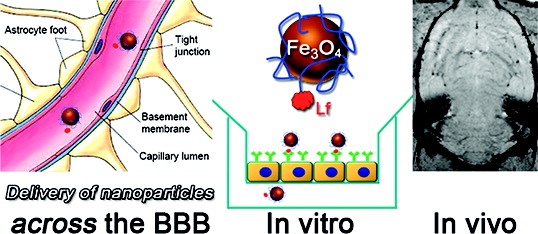| Location: Home >> News >> Research Progress | |||||||
| Research Progress | |||||||
| Receptor-Mediated Delivery of Magnetic Nanoparticles across the Blood-Brain Barrier http://www.gaomingyuan.com Tuesday, April 10, 2012 17:00 |
|||||||
 |
|||||||
Nanomaterials and nanotechnology have presented great potentials in biological analysis and clinical diagnosis. Magnetic nanocrystals, as the core material of a new type of magnetic resonance contrast agent, have shown a bright future in early detection and treatment of diseases. Although they are well suitable for magnetic resonance imaging (MRI), the magnetic nanoparticle-based contrast agents still suffer from the inability to cross biological barriers, such as Blood-Brain Barrier. Thus, the in vivo application of magnetic nanoparticles as MRI contrast agent for brain imaging is still limited and therefore challenging.
A brain delivery probe was prepared by covalently conjugating lactoferrin (Lf) to poly(ethylene glycol) (PEG) coated Fe3O4 nanoparticle in order to facilitate the transport of the nanoparticles across the blood-brain barrier (BBB) by receptor-mediated transcytosis via the Lf-receptor present on cerebral endothelial cells. The efficacy of the Fe3O4-Lf conjugate to cross the BBB was evaluated in vitro using a cell culture model for the blood brain barrier as well as in vivo in SD rats. For in vitro experiment, a well-established porcine BBB model was used based on the primary culture of cerebral capillary endothelial cells grown on filter supports thus allowing to follow the transfer of nanoparticles from the apical (blood) to the basolateral (brain) side. For in vivo experiments, SD rats were used as animal model to detect the passage of the nanoparticles through the BBB by MRI techniques. The results of both in vitro and in vivo experiments revealed that the Fe3O4-Lf probe exhibited an enhanced ability to cross the BBB in comparison to the PEG-coated Fe3O4 nanoparticles, and further suggested that the Lf receptor-mediated transcytosis was an effective measure for delivering the nanoparticles to cross the BBB. The results have been accepted by ACS Nano recently. This work is a collaborated research by three groups with different research disciplines, including Prof. Mingyuan Gao’s group from Institute of Chemistry, CAS, Prof. Hans-Joachim Galla’s group from Institute for Biochemistry, Westfaelische Wilhelms Universitaet, and Prof. Fabao Gao’s group from West China Hospital, Sichuan University. Prof. Gao’s kindly supervise and discussion with other groups make the research work smoothly. During the two years, the group member visited Münster for three times for the in vivo experiments and also visited Chengdu twice for the in vitro experiments. She is appreciated for the opportunity provided by Prof. Gao for the collaboration experience. Moreover, RQ is grateful to Prof. Helmuth Moehwald from MPIKG for kind support and stimulating discussion. Ruirui Qiao et al. |
|||||||